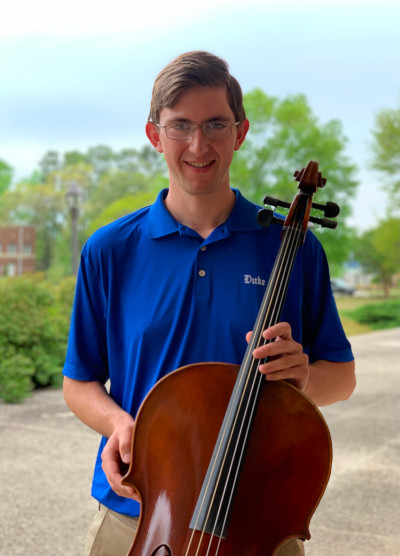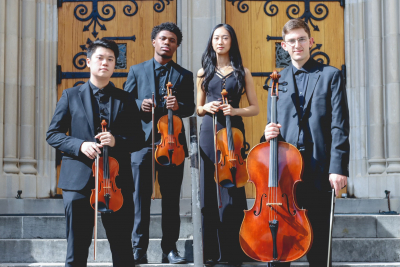Biology and Music Enhance the Human Experience

In May, Jacob Egol will earn his bachelor’s of science degree in Biology with a concentration in cell and molecular biology, as well as a minor in Music.
He was introduced to biology at Duke as a first-year student in the Exploration of Genetics and Genomics FOCUS cluster. Inspired by the course, as well as the many others spanning the subdisciplines of biology, Egol is pursuing an interest in cell and molecular biology and developmental biology.
The senior currently works in the Silver Lab, part of the Department of Molecular Genetics and Microbiology, where he’s researching embryonic brain development.
“I’m working on a senior honors thesis examining the neurobiological role of CNOT3, a subunit of a protein complex involved in mRNA decay that has been linked to neurodevelopmental disorders such as autism when mutated,” he said.
Alongside his biology courses and lab work, Egol was determined to include music in his studies at Duke.
The cello has been an important part of his life since elementary school. Having played in state-level honors orchestras and the World Youth Symphony Orchestra, he knew that he wanted to continue playing in college.
“Duke’s emphasis on a liberal arts education and investment in the arts was a significant influence on my decision to matriculate here,” he said.
“Knowing that I could be a Biology major while also being part of the vibrant Duke Music community was exactly what I was looking for, and this combination of science and the arts has defined my undergraduate experience.”
We asked Jacob about his accomplishments as a cellist at Duke, the relationship between biology and music and what he plans to do after graduation.
What has minoring in Music looked like at Duke?
The minor has allowed me to study music theory and music history, as well as applied music such as private cello lessons, chamber music and the Duke Symphony Orchestra. My musical studies will culminate in a senior recital for graduation with distinction in cello performance.
There have been so many unique musical opportunities at Duke. As cellist of the Larkspur Quartet, I traveled to Boston to study at the New England Conservatory, played informal salon concerts in first-year dorms and performed for the Trinity College Board of Visitors. We also taught students in Kidznotes, a Durham after-school program that teaches music as a model for social change.
I’ve performed in masterclasses for world-renowned cellists David Finckel and Alan Harris, collaborated with the Ciompi Quartet, played in the pit orchestra for Hoof ‘n’ Horn’s production “Into the Woods” and performed in the Duke Wind Symphony’s Viennese Ball Orchestra.
And as a 2022 recipient of Duke’s Benenson Award in the Arts, I attended the college orchestral institute at Brevard Music Center.
Why has it been important for you to include music courses in your studies at Duke when your career path is focused on cellular and molecular biology?
Biology and music may seem very different, but they complement each other in so many ways. Both are exacting and meticulous, so the skills I’ve learned from practicing solo cello or finely crafting a performance in an ensemble translate to studying biology or working in a lab.
Likewise, the discipline and attention to detail required in my biology courses strengthens my analytical focus in music.
And music provides inspiration and joy that balance the intensity and rigor of STEM-oriented learning. I’m inspired by the role that science and music both play in enhancing the human experience and improving the world.
What are your career goals after you graduate in the spring?
I plan to continue in scientific research and to attend graduate school in biology, with a view toward a career in the industry. I’ll also remain engaged with music — continuing to perform and hopefully joining an orchestra.
Wherever my work in science takes me, I know that music will accompany me!

